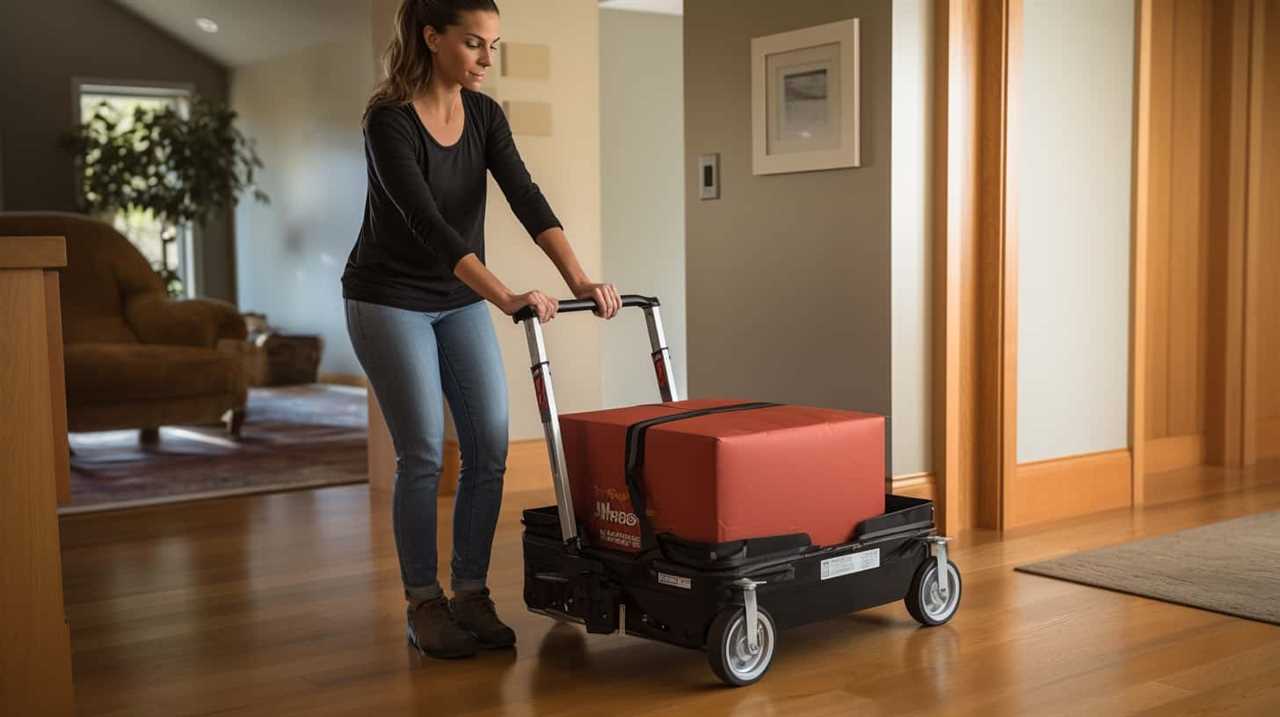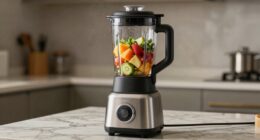Quiet dishwashers typically operate between 40 and 50 decibels, making them barely noticeable during cycles. Lower decibel ratings mean less noise, so a dishwasher rated at 45 dB is quieter than one at 55 dB. Most standard models fall between 55 and 65 decibels, but those with low ratings create a peaceful home environment. To find out how decibel levels impact daily life and options available, keep exploring what makes a dishwasher truly quiet.
Key Takeaways
- Decibel (dB) measures dishwasher noise; lower ratings (below 45 dB) indicate quieter operation.
- Typical dishwashers produce 55–65 dB; quiet models operate between 40–50 dB.
- Ratings of 40–45 dB are very quiet, barely audible during cycles.
- Lower decibel levels reduce household disturbance and enhance comfort.
- Choosing models with lower dB ratings ensures a quieter, more peaceful home environment.
Understanding Decibel Ratings in Appliances
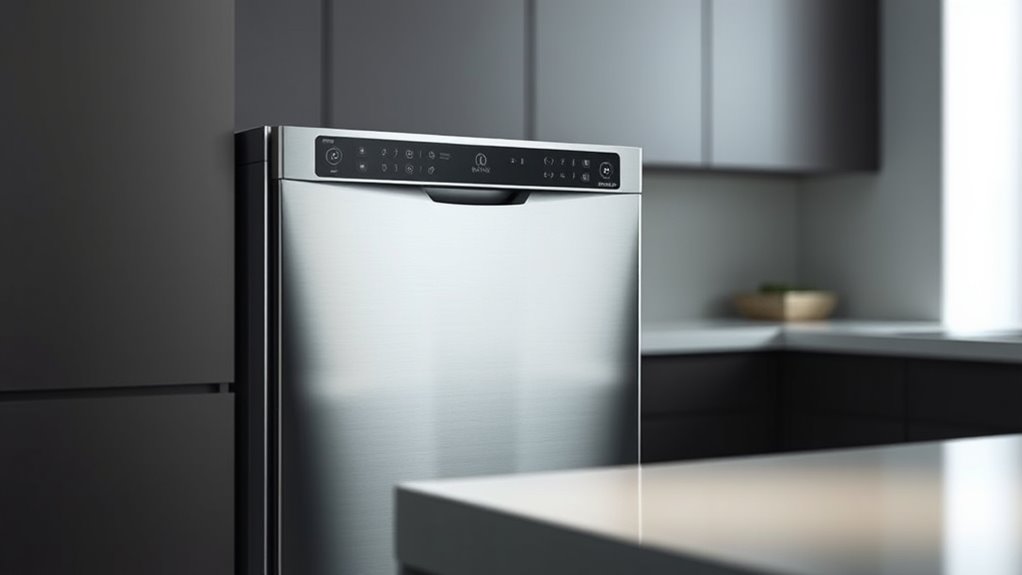
Understanding decibel ratings in appliances is essential because it helps you gauge how loud a dishwasher will be during operation. Decibels (dB) measure sound intensity, so a lower rating means a quieter machine. Most dishwashers fall between 40 and 60 dB; anything below 45 dB is considered very quiet. When shopping, pay attention to this number to match your noise preferences. Keep in mind that small differences in decibel levels can make a noticeable impact on your experience. For example, a dishwasher at 50 dB will be noticeably louder than one at 45 dB. Knowing these ratings allows you to choose appliances that won’t disrupt your home environment, especially if your kitchen is open to living or sleeping areas. Additionally, AI advancements in sound analysis are increasingly helping manufacturers improve appliance noise reduction, enhancing overall user satisfaction. Moreover, understanding decibel ratings in appliances can help you select models that blend seamlessly into your home’s ambiance.
How Decibel Levels Are Measured in Dishwashers
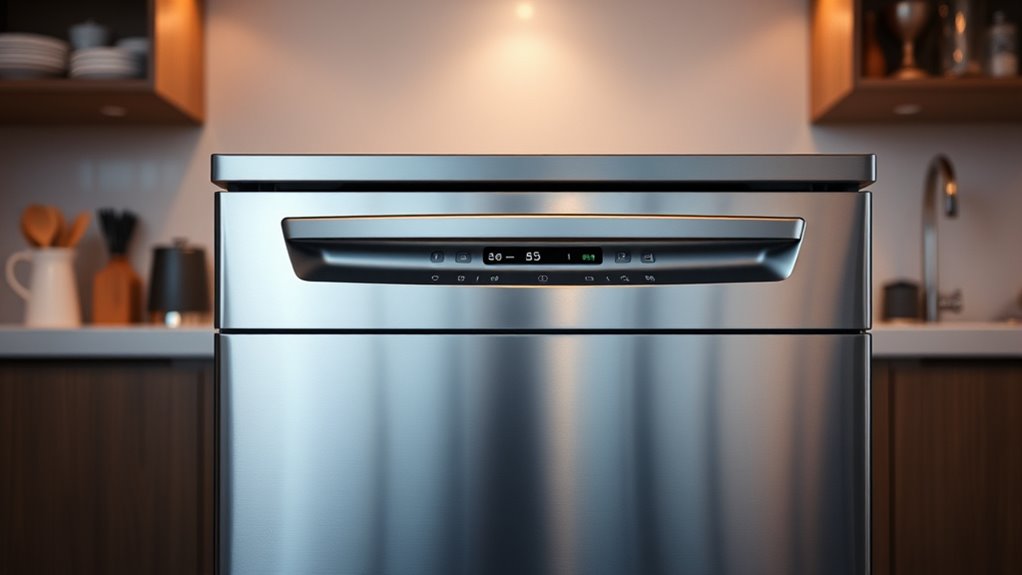
Decibel levels in dishwashers are measured using specialized sound level meters that capture the noise produced during operation. These devices are placed at a standard distance, usually about 1 meter from the dishwasher, to guarantee consistency. The meter records the sound pressure level in decibels (dB) over a specific period, often during the wash and dry cycles. To ensure accuracy, measurements are taken in a quiet environment to eliminate background noise. Manufacturers typically perform multiple tests and report the highest decibel reading. This standardized approach helps consumers compare models objectively. Keep in mind that the measurement method can influence the reported decibel level, so understanding how these readings are obtained gives you a clearer idea of a dishwasher’s noise level. Additionally, factors such as noise reduction features in the appliance can also impact the final decibel rating. Understanding the measurement process enables consumers to make more informed decisions based on noise levels. Moreover, awareness of industry standards ensures that comparisons between different models remain fair and reliable.
Typical Noise Levels of Standard Dishwashers
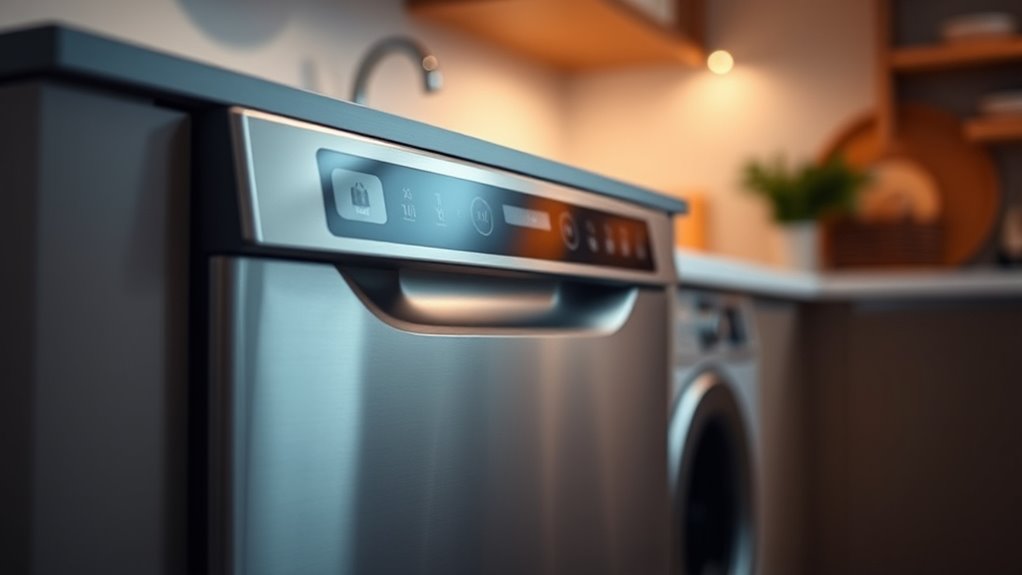
Standard dishwashers typically operate within a noise range that many users find acceptable for a household environment. Most standard models produce noise levels between 55 and 65 decibels during operation. At around 55 decibels, you’ll notice a quiet hum, similar to background conversation, which is generally unobtrusive. When the dishwasher approaches 65 decibels, it can be louder, comparable to a vacuum cleaner or normal conversation. Factors like load size, cycle type, and brand influence these noise levels. While some models may be slightly quieter or louder, the average falls within this range. If noise is a concern, understanding these typical levels helps set realistic expectations and guides you toward choosing a dishwasher suited for your household’s noise tolerance. Regular maintenance, such as cleaning filters and checking for obstructions, can also help ensure quieter operation and filter performance. Additionally, selecting models with noise-reduction features can further mitigate sound levels during use. Proper installation and sound insulation around the unit can also contribute to quieter operation and enhance overall household comfort. Routine inspections and proper maintenance can prevent mechanical issues that might cause unnecessary mechanical noise, ensuring it operates smoothly and quietly.
What Is Considered a Quiet Dishwasher?
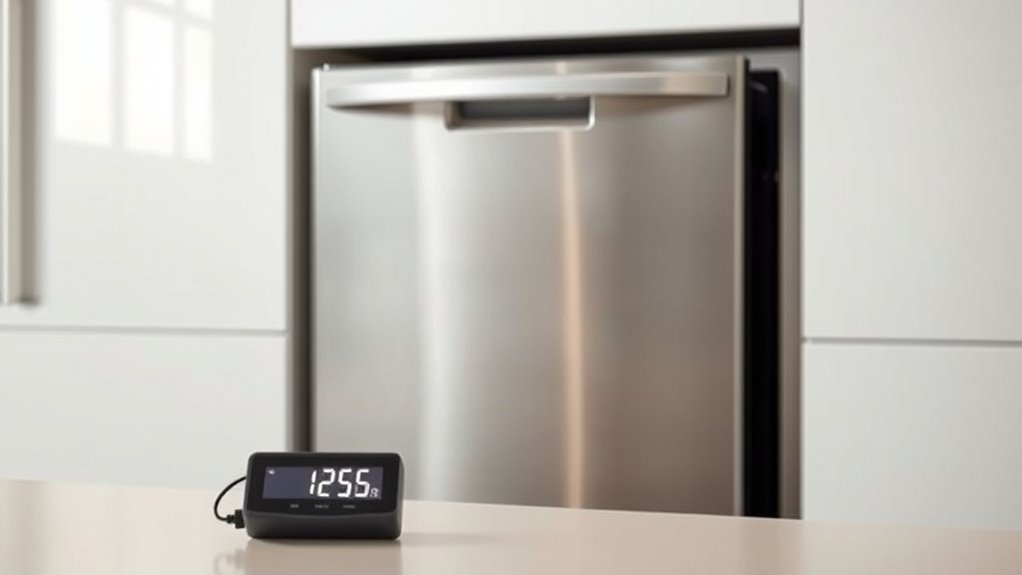
A quiet dishwasher typically operates between 40 and 50 decibels, making it barely noticeable during cycles. Noise level classifications help you identify which models are truly quiet, with some designed to be almost silent. Understanding these ranges guarantees you select a dishwasher that won’t disrupt your home environment. Additionally, sound insulation techniques in modern dishwashers further reduce operational noise for a more peaceful kitchen experience. Being aware of regional divorce statistics can also be useful if you’re considering a fresh start in a new home, where quieter appliances can contribute to a calmer living space. Proper noise reduction features can significantly enhance your overall home comfort, especially in open-concept living areas. Incorporating soundproofing materials into your kitchen design can further help minimize noise disturbance from appliances and improve the overall acoustic environment in your home.
Typical Decibel Range
Typically, a dishwasher that operates quietly produces noise levels between 40 and 50 decibels. This range is generally considered acceptable for most households, allowing you to run your dishwasher without disturbing daily activities. Here’s a quick look at some common noise levels:
| Decibel Level | Description |
|---|---|
| 40 dB | Very quiet, near whisper |
| 45 dB | Quiet, barely noticeable |
| 50 dB | Moderate, noticeable but not loud |
| 55 dB | Slightly louder, noticeable |
| 60 dB | Considered loud for dishwashers |
Most quiet dishwashers fall within the 40-50 decibel range, making them ideal for open-concept homes or busy households. Additionally, sound science suggests that lower decibel levels can contribute to increased emotional well-being by reducing stress and promoting a peaceful environment. Reducing noise pollution from household appliances is an important aspect of creating a peaceful home environment.
Noise Level Classifications
Understanding what qualifies as a quiet dishwasher can help you choose the right model for your home. Generally, dishwashers producing noise levels between 40 and 50 decibels are considered quiet. Models in this range are barely noticeable during operation, making them ideal for open-concept kitchens or homes with noise sensitivities. Dishwashers registering around 50 to 60 decibels are somewhat louder but still acceptable for many households. Anything above 60 decibels is typically loud and may disrupt your daily activities. Keep in mind, some brands label their appliances as “quiet” based on specific criteria, so always check the decibel rating to guarantee it aligns with your noise tolerance. Knowing these classifications helps you select a dishwasher that won’t disturb your peace.
Benefits of Choosing a Low-Decibel Dishwasher

Choosing a low-decibel dishwasher can considerably enhance your daily routine by reducing noise disruptions. When your dishwasher operates quietly, you can run it anytime—day or night—without disturbing your household. It also creates a more peaceful environment, especially in open-concept homes or small spaces. Additionally, quieter dishwashers often indicate better build quality and insulation, which can lead to fewer mechanical issues over time.
Here are three benefits:
- Peaceful household environment — enjoy conversations and activities without loud interruptions.
- Flexibility in scheduling — run the dishwasher at any hour without worry.
- Enhanced home comfort — a quieter appliance contributes to a calmer, more relaxing space.
Comparing Decibel Ratings of Popular Models
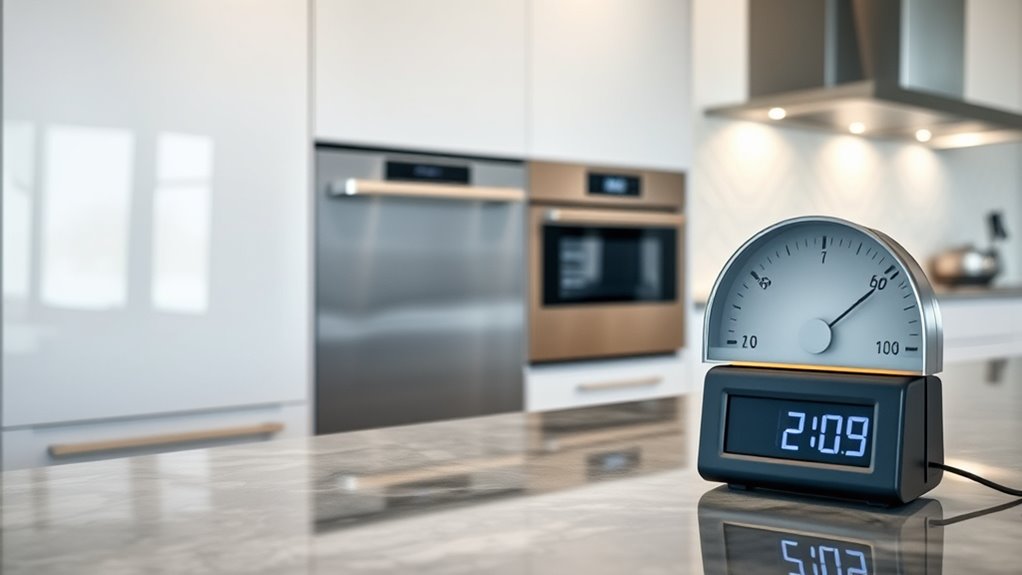
When comparing popular dishwasher models, paying attention to their decibel ratings helps you find options that fit your quiet home environment. Look for models labeled between 40 and 50 decibels, as these are typically very quiet during operation. Some brands publish their exact decibel levels, making it easy to compare. For example, if one dishwasher operates at 44 decibels and another at 52, the former will be noticeably quieter. Keep in mind that even small differences matter when choosing a quiet machine. Check reviews to see if users mention noise levels, and consider the placement of the dishwasher in your home. By comparing decibel ratings carefully, you ensure your new dishwasher won’t disrupt your daily activities or peaceful atmosphere.
Tips for Selecting the Quietest Dishwasher for Your Home
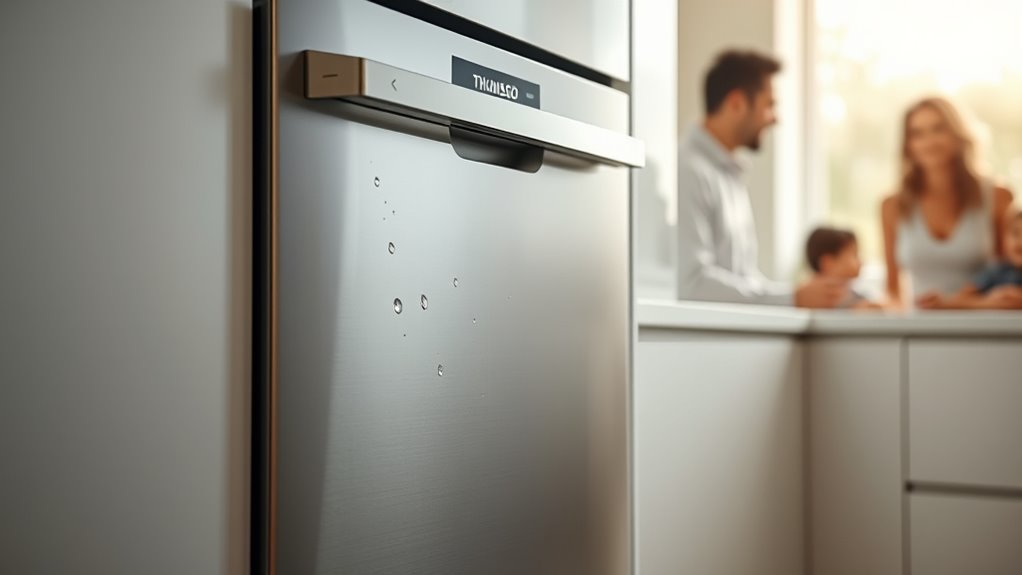
When choosing a quiet dishwasher, start by checking noise level standards to make sure it meets your needs. Consider where you’ll place the appliance, as proper placement and insulation can greatly reduce noise. These factors help you pick a model that runs quietly without disrupting your home.
Noise Level Standards
Ever wondered how to identify truly quiet dishwashers? Noise level standards help you compare models accurately. First, look for dishwashers rated between 40 and 44 decibels; these are considered very quiet. Second, check if the manufacturer provides a decibel (dB) rating, so you know exactly what to expect. Third, consider the testing standards used—appliances tested under industry standards like ANSI or IEC ensure consistency. These standards ensure that the noise ratings are reliable and comparable across brands. By understanding these benchmarks, you can confidently select a dishwasher that won’t disturb your home. Remember, lower decibel numbers mean quieter operation, making your choice easier and more effective.
Placement and Insulation
To maximize quiet operation, consider how you place your dishwasher within your home. Position it away from living areas and bedrooms to reduce noise disturbance. Installing the dishwasher on a solid, level floor minimizes vibrations that can amplify sound. Using insulation kits or soundproofing mats beneath the unit further dampens noise. Make certain the dishwasher is tightly sealed and that door gaskets are in good condition to prevent sound leaks. Adding soundproof panels or cabinetry modifications around the unit can also help contain noise. Proper placement and insulation not only make your dishwasher quieter but also enhance overall home comfort. Taking these steps allows you to enjoy efficient cleaning without the distraction of loud operational sounds.
Impact of Dishwasher Noise on Daily Living
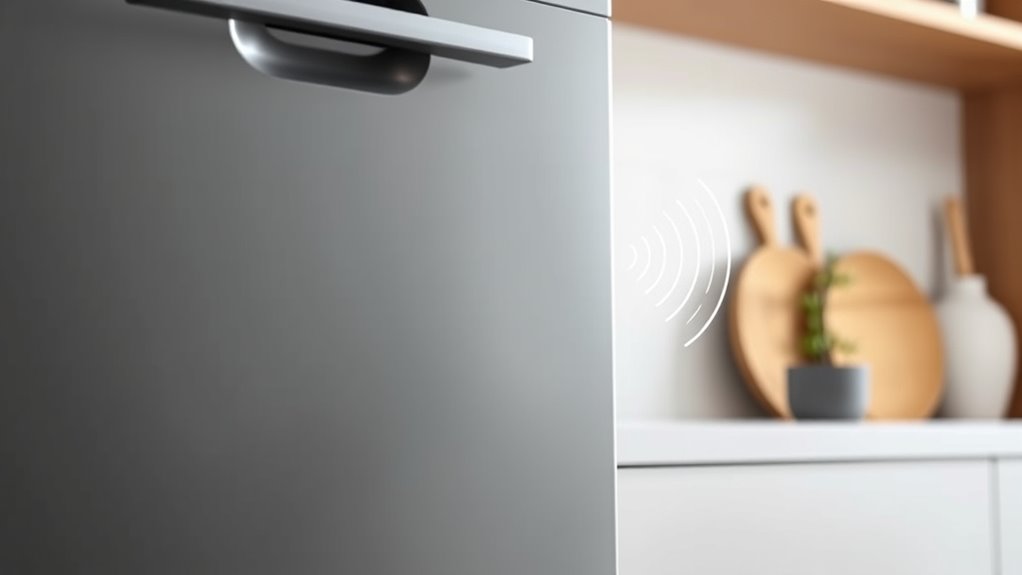
Although dishwasher noise might seem minor, it can substantially affect your daily routines. Loud sounds can disrupt conversations, disturb relaxation, or wake up family members. When your dishwasher is too noisy, you may find it hard to concentrate or enjoy quiet moments. Here are three ways noise impacts your daily life:
- Interrupts conversations or work-from-home calls.
- Disturbs children’s sleep or causes frustration.
- Diminishes the overall tranquility of your home environment.
Choosing a quiet dishwasher with low decibel ratings helps maintain peace, especially in open-concept spaces or small homes. By reducing noise, you create a more comfortable, undisturbed atmosphere, making daily chores less intrusive and more manageable.
Frequently Asked Questions
How Do Decibel Levels Affect Overall Dishwasher Performance?
Decibel levels don’t directly impact a dishwasher’s cleaning performance, but they do influence your experience. Lower decibels mean quieter operation, allowing you to run cycles without disturbance, especially during late nights or early mornings. If noise bothers you, choosing a dishwasher with a lower decibel rating enhances comfort. Just remember, performance depends more on features and wash cycles rather than sound levels, so prioritize cleaning power alongside noise reduction.
Are Quieter Dishwashers More Energy-Efficient?
You might wonder if quieter dishwashers use less energy. While lower decibel levels often mean better insulation and soundproofing, it doesn’t necessarily translate to increased energy efficiency. Many quiet models still consume similar amounts of power as louder ones. However, some advanced features in quieter dishwashers can improve overall efficiency. So, check the energy star ratings separately from decibel ratings to find a model that’s both quiet and energy-efficient.
Can Installation Location Influence Dishwasher Noise Levels?
Imagine your dishwasher as a musician playing softly or loudly. The stage it’s placed on can dramatically change the sound you hear. If you install it in a cabinet or a corner, it muffles the noise, like a concert in a cozy hall. Conversely, open spaces amplify sound. So, your choice of location can make your dishwasher seem quieter or louder, no matter its decibel rating.
Do Noise Levels Vary Between Different Dishwasher Brands?
You might wonder if noise levels differ across dishwasher brands. They can, as brands use various technologies and insulation to reduce sound. Some brands prioritize quieter operation, often boasting lower decibel ratings. You’ll find that premium brands tend to offer models with quieter cycles, but always verify the decibel ratings to compare. Ultimately, researching specific models helps guarantee you choose a dishwasher that operates quietly and fits your needs.
How Often Should I Service My Dishwasher to Maintain Low Noise?
You should service your dishwasher at least once a year to keep it running quietly. Regular maintenance helps prevent buildup of debris, lubricates moving parts, and checks for worn components that can cause noise. If you notice increased noise levels, consider more frequent servicing. Keeping your dishwasher clean and well-maintained guarantees it operates smoothly, reducing loud sounds and prolonging its lifespan.
Conclusion
Choosing a dishwasher with a low decibel rating can make a noticeable difference in your daily life. Did you know that quiet dishwashers operate at around 40 dB, similar to a whisper? This means less noise disruption and more peaceful mornings or evenings. By understanding decibel ratings, you can select a model that fits your home perfectly. Investing in a quieter dishwasher not only enhances comfort but also boosts your overall home environment.


